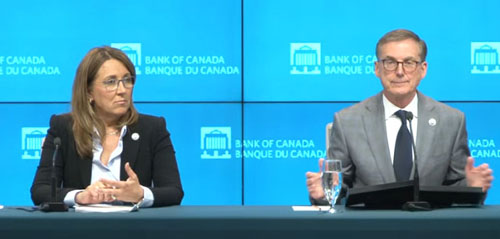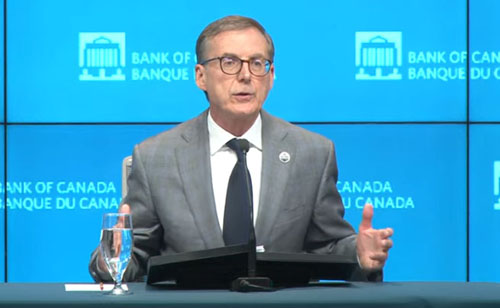Wednesday June 5, 2024 | VICTORIA, BC [Last update 3 pm PDT]
Socioeconomic reporting by Mary P Brooke | Island Social Trends
A cautious interest rate drop of 0.25% was announced this morning by the Bank of Canada.
The rate is now 4.75%, down from 5.0% where it’s been since July of last year. This is the first rate reduction since March 2020.

More interest rate reductions are to come but it will be a cautious,. Rates will not go back to pre-COVID levels, said Bank of Canada Governor Tiff Macklem.
The next rate announcement is scheduled for July 24, 2024.
Economy and wage growth are slower. Slower employment is happening as well.
“We’re headed to a two percent inflation rate,” and measures will be taken to get there, said Macklem.
Monetary policy is working:
The bank governor is comfortable with the long-term direction. Monetary policy is working, Macklem emphasized today. He knows that households and businesses have been squeezed and the Bank realized that restriction didn’t need to be as tough as it’s been, said Macklem today.
“We’ve come a long way,” said Macklem. Growth has resumed in the Canadian economy.
“Inflation will continue to move slowly back to the two percent target,” said Macklem in his press conference today in Toronto.
Bank response:
Within a few hours, Royal Bank of Canada was the first major Canadian financial institution to decrease its prime rate by 25 basis points to 6.95% from 7.20% effective June 6. Following that, TD Canada Trust, Bank of Montreal and CIBC also announced a cut by 25 bps.
BC response:
Today during media questions, BC Premier David Eby took yet another shot at the Bank of Canada regarding how difficult things have been for families and households as a result of the many interest rate increases over 2022-2023 (and holding now half-way into 2024) which has bled into impacting the cost of housing as well.
Last year Eby took the lead — followed by other premiers — in commenting on the many consequences for families and small businesses as a result of the grinding impact of higher interest rates.
Later in the day today, Eby posted on social media: “This is overdue but welcome. High rates have increased housing costs and will wrack people up for renewal, the biggest driver of inflation in BC.”
Gradual recovery:
“The path for interest rates is likely to be gradual,” he said today.
Growth in the first quarter at 1.7% was weaker than expected; the bank’s own forecast had been 2.8%. Macklem said that indicates that individual households were reducing their spending.
In the first quarter the housing market was positive “but not particularly strong”. They expect ‘household strength; to grow.
Immediate impacts:
Individual households and small business will notice the difference in any variable rate financial products right away, such as variable rate mortgages or loans. Credit cards are usually not quick to respond with immediate rate adjustments.
Development and growth have been impacted:
Media posed the premise that a higher for longer interest rate environment has impeded development. Senior Deputy Bank of Canada Governor Carolyn Rogers responded by saying the Bank will see how a lower interest rate will translate into investment. She acknowledged pent-up demand in the housing market.
“The US is the biggest source of Canadian exports, we also import a lot,” said Macklem.
“People holding mortgages are feeling the squeeze,” said Rogers. “Credit stress is also showing up in renters — that is inflation as well as interest rates showing up. What we can do is get inflation back to target. We need to get inflation back to target and we’re determined to do that,” she said today.
Impact of population growth:
Population growth affects both demand and supply, Macklem explained. “More workers add to the labour force. But newcomers need to rent apartments, they need housing,” said Macklem.
Recession no longer likely:
“So far it’s looking like a soft landing,” said Macklem regarding preventing a recession.








